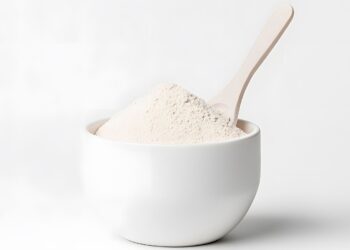Understanding Protein Needs
Protein is an essential nutrient for building and repairing tissues, producing enzymes, and supporting overall body functions. For fitness enthusiasts and athletes, protein is a critical component of their diet to help in muscle recovery and growth. While whole foods like eggs, meat, and legumes are great sources of protein, many people turn to protein powders for convenience and to meet their specific needs. With so many options available, it can be difficult to choose the best one. This guide will take you through seven popular types of protein powder and help you determine how to select the best one for your goals. If you’re also looking to enhance strength and performance alongside your protein intake, you might be interested in Creatine Monohydrate for Sale, a well-known supplement that complements many fitness routines.
Before diving into the different types of protein powder, it’s important to understand how much protein you need. The Daily Value for protein is 50 grams a day based on a 2,000-calorie diet, but athletes and those with higher fitness goals often aim for 0.6 to 0.8 grams per pound of body weight. Depending on your specific needs, a dietitian can help tailor the right amount of protein for your lifestyle.
Types of Protein Powder
Egg White Protein
Egg protein powder is made from dried egg whites, offering a dairy-free alternative for those who avoid milk-based products. It’s also absorbed at a moderate rate, making it a balanced choice between fast-digesting whey and slow-digesting casein.
Key Points:
- Egg white protein digests slower than whey but faster than casein.
- Ideal for anyone with dairy allergies or lactose intolerance.
- Though not as efficient as whey in muscle protein synthesis, it’s still effective post-workout or as a meal replacement.
- Egg protein powder provides a complete amino acid profile, making it a good option for those looking to boost protein intake.
Whey Protein
Whey protein, a byproduct of cheese-making, is one of the most widely used protein powders. Known for its fast absorption, whey enters the bloodstream quickly and contains a high concentration of leucine, an amino acid essential for muscle growth. There are two types of whey protein to consider: whey concentrate and whey isolate.
Whey Concentrate:
- Contains lactose and fat, making it less processed.
- Typically has a protein content ranging from 78-88%.
- Affordable and often more flavorful compared to isolate.
Whey Isolate:
- Has the carbs and fats removed, yielding up to 98% protein.
- Ideal for those who are lactose intolerant.
- Fast-absorbing and great for post-workout recovery.
Casein Protein
Casein, another milk-derived protein, digests slower than whey. This slower digestion makes it perfect for athletes looking for a steady release of protein over time, especially when taken before bed. Like whey, casein is rich in essential amino acids, but it takes longer to break down, ensuring a prolonged release of nutrients.
Soy Protein
Made from soybeans, soy protein is one of the most popular plant-based protein powders. It contains all nine essential amino acids, making it a complete protein. However, some individuals are concerned about its potential effects on hormone levels.
Key Points:
- A complete plant-based protein source.
- Contains glutamine and arginine, which support immune and digestive health.
- May not be ideal for individuals with estrogen-related health concerns.
Pea Protein
Derived from yellow peas, pea protein is another plant-based option that is easy to digest. While it lacks some essential amino acids, it can be paired with other proteins to form a complete profile.

It’s also hypoallergenic, making it a great option for those with food sensitivities.
Key Points:
- Highly digestible and gentle on the stomach.
- Not a complete protein on its own but can be paired with other sources like rice or hemp protein.
Hemp Protein
Hemp protein is sourced from hemp seeds and is rich in fiber and omega-3 fatty acids. While its protein content is lower than other powders, it offers a more comprehensive nutritional profile.
Key Points:
- Contains fiber and omega-3s, making it nutritionally diverse.
- Lower in protein content compared to whey or egg protein powder.
- Best suited for those looking for additional nutrients beyond just protein.
Collagen Protein
Collagen is the most abundant protein in the body, and collagen protein powder supports skin, hair, and joint health. It’s not a complete protein as it lacks one of the essential amino acids but can still be a useful addition to a balanced diet.
Key Points:
- Promotes healthy skin, hair, and joints.
- Not a complete protein but can be paired with other sources for better results.
How to Choose the Right Protein Powder
When selecting the best protein powder for your needs, several factors come into play, including dietary preferences, fitness goals, and any food sensitivities you may have.
Factors to Consider when selecting the best protein powder:
1. Dietary Restrictions:
- If you’re lactose intolerant, consider egg protein powder, egg white protein, or plant-based options like soy or pea protein.
2. Digestibility:
- If you have a sensitive stomach, pea protein or egg white protein are good options, as they are easy to digest.
3. Fitne/ss Goals:
- For muscle gain, whey protein is typically the best option due to its high leucine content. If fat loss is your primary goal, whey isolate or egg white protein are ideal for their low-fat and low-carb profiles.
4. Allergies:
- If you have allergies to dairy, egg white protein is a good alternative, providing high-quality protein without the need for dairy.
5. Nutritional Profile:
- Look for protein powders with minimal added ingredients, artificial sweeteners, or preservatives. Egg white protein powder is a simple and clean option, while hemp or pea protein offer added nutritional benefits like fiber and omega-3 fatty acids.
Finding the Right Egg Protein Powder for Your Diet
When it comes to selecting an egg protein powder, the purity of ingredients and absence of additives should be top priorities. Egg white protein powder provides a complete amino acid profile, making it one of the most effective dairy-free protein powders. Here’s why it stands out:
High Protein Content
Egg white protein powder offers a high concentration of protein per serving, often around 20-25 grams. This makes it an excellent choice for those looking to boost their daily protein intake.
Complete Amino Acid Profile
Unlike some plant-based options, egg protein powder contains all nine essential amino acids that your body needs but cannot produce on its own.

This makes it comparable to animal-based proteins like whey and casein.
Low Allergen Potential
For those who are allergic to dairy or soy, egg protein powder provides a safe alternative without sacrificing protein quality or content.
Versatile Usage
Egg protein powder can easily be mixed into smoothies, shakes, or baked goods, offering flexibility for various dietary preferences.
Making the Right Choice for Your Fitness Journey
Choosing the right protein powder can significantly impact your fitness progress and overall well-being. Among the different types available, egg white protein powder and egg protein powder offer excellent options for those seeking a dairy-free, high-quality protein source. Gaspari Nutrition’s PROVEN EGG is a premium option that delivers a complete amino acid profile with minimal additives, helping you meet your fitness goals efficiently. For a wide range of high-quality protein powders, including PROVEN EGG, consider exploring Gaspari Nutrition’s product line to find the perfect fit for your dietary needs and fitness aspirations.







